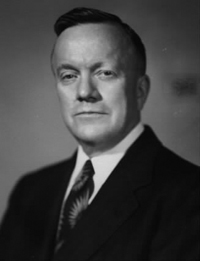 An epidemiologist and virologist, CHARLES ARMSTRONG, Med 1915, (1886-1967) earned an international reputation for his groundbreaking work in polio research and prevention and for his skills as an intrepid microbe hunter, tracking down the sources of disease outbreaks. Born in Alliance, Ohio, Armstrong earned a bachelor’s degree in 1910 from Mount Union College, and graduated from the Johns Hopkins School of Medicine in 1915. As a physician in the U.S. Public Health Service (USPHS), he worked briefly at the immigration station at Ellis Island, and during World War I served as a Navy medical officer aboard the U.S. Coast Guard Cutter Seneca. In 1918, the USPHS brought Armstrong back to the U.S. to join the team investigating outbreaks of the deadly influenza pandemic in several states. It was during this assignment that he met Wade Hampton Frost, MD, a fellow USPHS officer and a pioneer in the discipline of epidemiology who directed his work during the pandemic. Armstrong credited Frost, who in 1919 founded and chaired the Department of Epidemiology at the Johns Hopkins School of Hygiene and Public Health and served as the school’s dean from 1931 to 1934, with sparking his interest in epidemiological investigation. In 1921, Armstrong joined the Hygienic Laboratory in Washington, DC, the precursor to the National Institutes of Health (NIH), where he remained until 1950. He served as chief of the Division of Infectious Diseases from 1941 to 1948. Armstrong is best known for his advances in polio research, most importantly his 1939 success in adapting and transmitting, for the first time, a human strain of poliomyelitis virus from monkeys to mice. His work in the new field of virology led him to contract some of the diseases he studied, including malaria, dengue fever, encephalitis, and psittacosis. After his official retirement in 1950, Armstrong continued to pursue his research at NIH.
An epidemiologist and virologist, CHARLES ARMSTRONG, Med 1915, (1886-1967) earned an international reputation for his groundbreaking work in polio research and prevention and for his skills as an intrepid microbe hunter, tracking down the sources of disease outbreaks. Born in Alliance, Ohio, Armstrong earned a bachelor’s degree in 1910 from Mount Union College, and graduated from the Johns Hopkins School of Medicine in 1915. As a physician in the U.S. Public Health Service (USPHS), he worked briefly at the immigration station at Ellis Island, and during World War I served as a Navy medical officer aboard the U.S. Coast Guard Cutter Seneca. In 1918, the USPHS brought Armstrong back to the U.S. to join the team investigating outbreaks of the deadly influenza pandemic in several states. It was during this assignment that he met Wade Hampton Frost, MD, a fellow USPHS officer and a pioneer in the discipline of epidemiology who directed his work during the pandemic. Armstrong credited Frost, who in 1919 founded and chaired the Department of Epidemiology at the Johns Hopkins School of Hygiene and Public Health and served as the school’s dean from 1931 to 1934, with sparking his interest in epidemiological investigation. In 1921, Armstrong joined the Hygienic Laboratory in Washington, DC, the precursor to the National Institutes of Health (NIH), where he remained until 1950. He served as chief of the Division of Infectious Diseases from 1941 to 1948. Armstrong is best known for his advances in polio research, most importantly his 1939 success in adapting and transmitting, for the first time, a human strain of poliomyelitis virus from monkeys to mice. His work in the new field of virology led him to contract some of the diseases he studied, including malaria, dengue fever, encephalitis, and psittacosis. After his official retirement in 1950, Armstrong continued to pursue his research at NIH.
Return
to All Schools
Dr. Charles Armstrong Chair in Epidemiology
Bloomberg School of Public Health
Epidemiology
Established in 2010 by Mary Emma Armstrong, in memory of her parents
Held by Shruti Mehta
 SHRUTI MEHTA, PhD, MPH, is a Professor and the Deputy Chair of the Department of Epidemiology at the Johns Hopkins Bloomberg School of Public Health. She received a Master’s in Public Health (1997) and a PhD (2002) in Epidemiology also from the Johns Hopkins Bloomberg School of Public Health. Her research focuses on HIV and hepatitis C virus (HCV) infection among people who inject drugs (PWID) in the US and in India with a particular interest and focus on identifying and overcoming barriers to access care and treatment for HIV and HCV.
SHRUTI MEHTA, PhD, MPH, is a Professor and the Deputy Chair of the Department of Epidemiology at the Johns Hopkins Bloomberg School of Public Health. She received a Master’s in Public Health (1997) and a PhD (2002) in Epidemiology also from the Johns Hopkins Bloomberg School of Public Health. Her research focuses on HIV and hepatitis C virus (HCV) infection among people who inject drugs (PWID) in the US and in India with a particular interest and focus on identifying and overcoming barriers to access care and treatment for HIV and HCV.